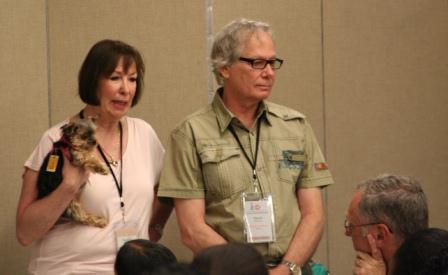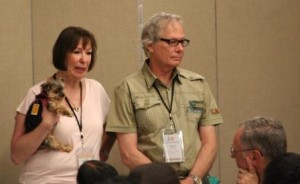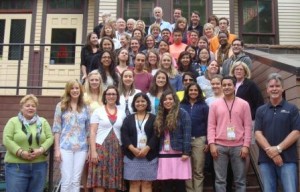
When Helen Haskell lost her son Lewis to medical harm, becoming a medical educator most likely was the furthest thought from her mind. The same, I would imagine holds true for Patty and David Skolnik and Carole Hemmelgarn, patient advocates who also lost children entrusted to healthcare professionals. But when these incredible individuals rose above their anger and grief, and crossed paths with patient safety visionary David Mayer MD, remarkable things grew out of their loss.
The Best Teachers
David Mayer’s career has centered around engaging patients—as an anesthesiologist, a medical educator and now, as VP, Quality & Patient Safety, MedStar Health. Whether engaging patients at the bedside, recruiting patient advocates to help design patient safety curriculum, or leading a ten-hospital health system to zero preventable harm, Dave openly shares that his best teachers have been patients and families. He began inviting patient advocates into the classrooms at University of Illinois Medical Center in 2006 when he asked Helen to share their family’s story of loss to medical, nursing, pharmacy and public health students.
The Redesign of Medical Education
Inviting Helen to help educate medical students in the classroom was a natural extension of Dave’s collaborative work at the Telluride Patient Safety Educational Roundtable, a think tank of patient safety leaders he founded in Telluride, CO in 2004. The original goal of the Telluride Roundtable was to begin discussions to redesign medical education in such a way that students would be exposed to patient safety work throughout their training, as opposed to the single, three-hour seminar many still receive today. Dave knew that engaging patients and families in these conversations would not only enrich their education, but also provide insight into areas healthcare professionals may miss.

Telluride students learn about the human side of medicine from patient families like the Skolniks whose son suffered the consequences of an unnecessary brain surgery.
With the opening of the Telluride Patient Safety Summer Camps (TPSSC, @TPPSC) in 2010, Dave was able to provide, an interdisciplinary patient safety learning environment for medical, nursing and pharmacy students, as well as resident physicians with patient and healthcare advocates, like Helen, Patty and David, and Carole on the faculty. Since that time, over 400 alumni have participated in the Telleride Experience, adding their voices to these conversations and learning the value of:
- Open, honest communication throughout the healthcare encounter
- Engaging patients in their care
- Using stories to change behavior
- Learning skills such as negotiation, leadership and better communication
The Power of Storytelling
The power of stories is called upon regularly during the Telluride Experience. Patient and healthcare advocates continue to return as Telluride faculty to share their stories—stories that leave a lasting imprint on the hearts and minds of the alumni and faculty audience. From 2007-2009, Dave and colleague Tim McDonald along with a small team of passionate colleagues and family members, contributed their own time and resources to create two educational documentary films inspired by Helen and the Skolniks’ stories. The films are a foundational piece of the TPSSC curriculum, and in each session, they stimulate emotional conversations around what was missed, how to avoid future similar harm, and the hidden curriculum of medicine. They provide a live case study that demonstrates how pivotal patient engagement through shared decision-making, meaningful informed consent and including families in the conversation are to the delivery of safe, high quality healthcare.
The Human Side of Medicine
When Helen or the Skolniks lead the group conversation after the film, an additional element is added to the learning. Young medical students who have yet to even see this side of medicine are exposed in vivo to the impact their future decisions will have on the kind, loving people before them. The patient becomes more than a procedure, and the audience realizes first-hand just how human both patients and healthcare professionals are. Time and time again, we have seen how these stories change people in the moment. We look forward to studying in greater detail how to make that change last.
Healing, Empowerment, Growth
The Telluride Experience has not only proven to be an educational experience like none other, but also a place of healing, empowerment and professional growth for students, faculty and patient advocates alike. The interdisciplinary experience has broadened patient safety education and the overall outlook on patient engagement for over 400 future healthcare leaders to date. We hear regularly from alumni about the initiatives they are leading at their own medical schools and health systems, inspired by their time in Telluride. For example, two resident physician alumni say:
“It’s clear our week in Telluride transformed our thinking about quality and patient safety.” Michael Kantrowitz, MD
“If I had spent the last four days locked in a library researching patient safety literature non-stop, I would not have walked away with as much knowledge, enthusiasm, and support…” Jon Hatoun, MD
A New Vision of Care
By selecting students and residents who exhibit both a track record of leadership skills and a strong interest and passion in patient safety, we believe we are building an alumni network that will infuse the learnings of Telluride, not only into each student’s home institution, but also help lay the groundwork for a new cultural foundation in healthcare. Our vision is for a system of care, based on patient engagement, transparency and the open, honest and professional communication that results in safer care for all. Students and resident physicians come away from their week with us committed to being change agents in their home environments as demonstrated in their personal reflections on the Telluride Summer Camp blog (www.telluridesummercamp.com/blog) and quality improvement work once home.
It’s evident the TPPSC curriculum hits the hearts and minds of alumni. You need only look at its growth. In 2015, there will be five sessions—three, one-week sessions for health science students to be held in Telluride, Napa, CA and Washington DC, and two, one-week sessions for resident physicians to be held in Telluride and Washington DC. For more information, you can go to www.telluridesummercamp.com.





